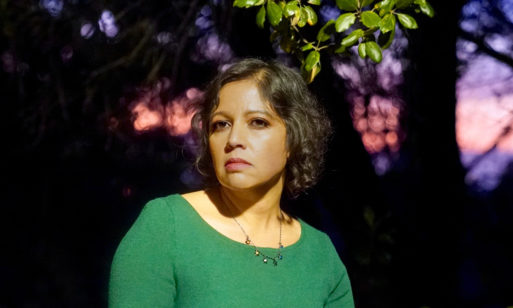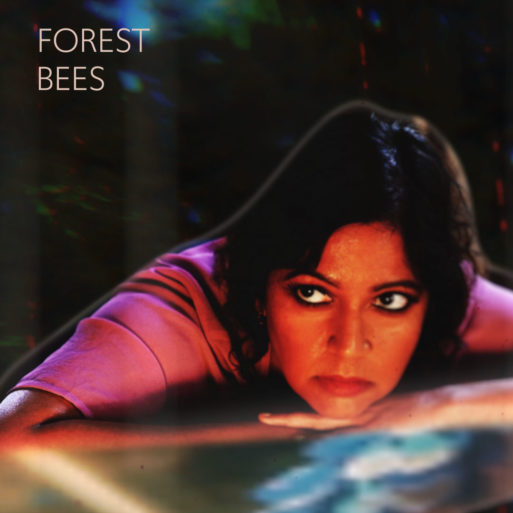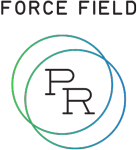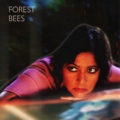
photo credit: Noah Larson
Contact
- John Cohill at Force Field PR
[email: john@forcefieldpr.com]
Bio
At a glance, the genesis of Forest Bees (aka San Francisco solo artist Sheetal Singh) reads like standard music biz fare: a critically-acclaimed indie band has a brush with the big time, fizzles in the face of industry frustrations, and a former member goes it alone.
Only Forest Bees is going it alone fifteen years later, as a mother of two and, as she puts it, “a brown woman in what is still a very white indie rock world”. And Forest Bees explores themes rare in such dream pop, from postpartum depression and loneliness within marriage, to cultural expectations and humanity’s intersection with artificial intelligence.
In the early aughts Singh played bass for San Francisco shoegazers The Stratford 4 which, after two acclaimed indie albums, was signed to Elektra Records by Cars legend Ric Ocasek. Ocasek produced their third record, but it got lost in the post-Napster music industry meltdown and the band split. The Stratford 4 reunited in 2015 to rave reviews but also, for Singh, a realization.
“I was bored. It wasn’t what I wanted to do. In fact, it never really was,” she recalls. “I never felt like I was able to express myself in the Stratford 4, which was a white, male-fronted, guitar-heavy shoegaze band. I did love the music and my bandmates … [But] I knew I needed to do it on my own terms.”
So Singh taught herself the software she’d need to make music alone – beats, bass, and keys beneath her gauzily impassioned vocals – while sampling everything from whale song to overheard conversations, and even having her kids record ear-catching sounds on their phones. The resulting Forest Bees album marries the dreamy electronic pop of Mazzy Star and Ladytron to Singh’s deep love for England’s ‘80s/’90s “Manchester scene” (The Smiths, New Order, Stone Roses etc.), and the often melancholy Bollywood music she’d listen to with her mom while growing up in Buffalo, N.Y.
“My mother wanted to be a classical Indian singer, but that was not considered appropriate for an upper middle class Indian girl/woman, so she was married off to my father and sent to live in America,” recalls Singh, who has twice lived in England, where she first learned guitar and – having struggled with an inherited sense of what is “appropriate” for a woman of her background – played in her first band.
All of this seeps into Forest Bees, which retains a disarmingly whimsical tone despite its often detached, outsider aura. The layered bleakness of “Fever Dream” oozes Singh’s love for London (where she wrote the song); “Off Color” conveys the heartbreak of seeing her daughter still struggling with white standards of beauty, a generation on from her own similar insecurities; while “Observer of Geography” – written in two spells, 12 years apart – mulls the excitement of her band’s major-label signing and her imminent marriage in its first verse, then the dissolution of both in its second.
“The ten songs on the album are me … singing about loneliness, longing and (not) belonging,” Singh explains. “Obviously, the songs were written before the Coronavirus pandemic, but it’s eerie that the themes I touch on- isolation, anxiety, feeling trapped- are shared by so many right now.”
Outside of music, she’s executive director of an innovation lab, and Forest Bees also explores the impact of technology (AI in particular) on our everyday lives and loves – for better and for worse.
“We have built a world that feels cold, but our desire to connect is very real,” says Singh. “These are songs about the AI powered robot-gods who control our fates and hold our faith. About connection and isolation and the way technology fills and broadens the spaces between us.”
Hugely atmospheric album opener “Alexa” exists in a place where humans and machines have connected into a benevolent neural network wherein the likes of Alexa and Siri have become, in Singh’s words, “angels who are looking out for us.” Yet, while ostensibly dystopian, her message is nuanced, implying that humanity will prevail in concert with technology, rather than being entirely eclipsed or simply surviving in spite of it.
Elsewhere, Forest Bees visits perennials of the human condition with a gently experimental sense of adventure: loneliness (“Alone/Together’); shifting self-perceptions of motherhood (“Hollow Bones”); the ache of desire (first single “Golden Dream”); and album closer “Dust”, which Singh characterizes as “a noisy ‘fuck you’ to the whole world.”
The Forest Bees self-titled debut was recorded at Ruminator Audio in San Francisco and produced by former Swell bassist Monte Vallier. “[He] really became my thought partner in this project,” says Singh, whose reference playlist for Vallier included the diverse likes of His Name is Alive, Frank Ocean, Broadcast, and Kid Cudi. The album was mixed by Vallier and Joel Ford (Bob Moses, Perfume Genius etc.), and mastered by Heba Kadry (Björk, Deerhunter etc.).
“Overall, I think [Forest Bees] is the sound of real life and the realization that the dreams we have for ourselves when we are younger may not come true,” Singh concludes. “But we never fully lose hope that something better is around the corner.”
Current Release

Forest Bees
Forest Bees
(Self-Released)
Street Date: June 12, 2020
Track List:
1. Alexa
2. Alone/Together
3. Hollow Bones
4. Subverter of Geography
5. Golden Dream
6. Observer of Geography
7. Fever Dream
8. Off Color
9. In June
10. Dust
Photos (click for high res)
photo credit: Noah Larson (1-4)





